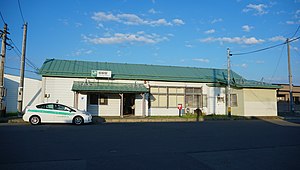Itayanagi Station
Itayanagi Station 板柳駅 | |||||||||||||||
|---|---|---|---|---|---|---|---|---|---|---|---|---|---|---|---|
 Itayanagi Station in September 2019 | |||||||||||||||
| Location | Fukunoda Minoruta 48, Itayanagi-cho, Minamitsugaru-gun, Aomori-ken 038-3661 Japan | ||||||||||||||
| Coordinates | 40°41′50.89″N 140°27′41.68″E / 40.6974694°N 140.4615778°ECoordinates: 40°41′50.89″N 140°27′41.68″E / 40.6974694°N 140.4615778°E | ||||||||||||||
| Operated by | |||||||||||||||
| Line(s) | ■ Gonō Line | ||||||||||||||
| Distance | 138.9 kilometers from Higashi-Noshiro | ||||||||||||||
| Platforms | 1 island platform | ||||||||||||||
| Other information | |||||||||||||||
| Status | Staffed (Midori no Madoguchi ) | ||||||||||||||
| Website | www | ||||||||||||||
| History | |||||||||||||||
| Opened | September 25, 1918 | ||||||||||||||
| Passengers | |||||||||||||||
| FY2016 | 351 | ||||||||||||||
| Services | |||||||||||||||
| |||||||||||||||
| Location | |||||||||||||||
 Itayanagi Station Location within Japan | |||||||||||||||
Itayanagi Station (板柳駅, Itayanagi-eki) is a railway station located in the town of Itayanagi, Aomori Prefecture, Japan, operated by the East Japan Railway Company (JR East).
Lines[]
Itayanagi Station is served by the Gonō Line. It is 138.9 rail kilometers from the terminus of the line at Higashi-Noshiro.
Station layout[]
Itayanagi Station has a single ground-level island platform, connected to the station building by a footbridge. The station has a Midori no Madoguchi staffed ticket office.
Platforms[]
| 1 | ■ Gonō Line | For Goshogawara, Ajigasawa and Fukaura |
| 2 | ■ Gonō Line | For Kawabe, Hirosaki and Aomori |
History[]
Itayanagi Station was opened on September 25, 1918 as a station on the Mutsu Railway. It became a station on the Japanese Government Railways (JGR) when the Mutsu Railway was nationalized on June 1, 1927. With the privatization of the Japanese National Railways (successor to JGR) on April 1, 1987, it came under the operational control of JR East.
Passenger statistics[]
In fiscal 2016, the station was used by an average of 351 passengers daily (boarding passengers only).[1]
Surroundin area[]
 National Route 339
National Route 339- Itayanagi town hall
- Itayanagi Post Office
- Itayanagi onsen
See also[]
- List of Railway Stations in Japan
References[]
- ^ 各駅の乗車人員 (2016年度) [Station passenger figures (Fiscal 2016)] (in Japanese). Japan: East Japan Railway Company. 2017. Retrieved 1 January 2018.
- Endo, Isao (2006). 五能線物語 「奇跡のローカル線」を生んだ最強の現場力 (Gono-sen Monogatari) (in Japanese). PHP研究所. ISBN 4569830099.
- 五能線ガイドブック (Gono-sen Guidebook) (in Japanese). 無明舎出版. 2002. ISBN 4895443078.
External links[]
| Wikimedia Commons has media related to Itayanagi Station. |
- Official website (in Japanese)
- Stations of East Japan Railway Company
- Railway stations in Aomori Prefecture
- Gonō Line
- Itayanagi, Aomori
- Railway stations in Japan opened in 1918
- Aomori Prefecture railway station stubs
